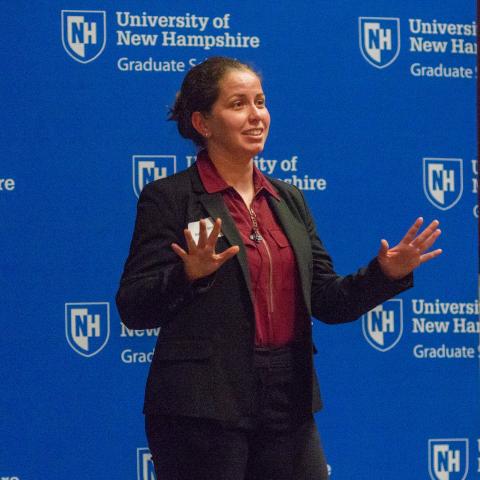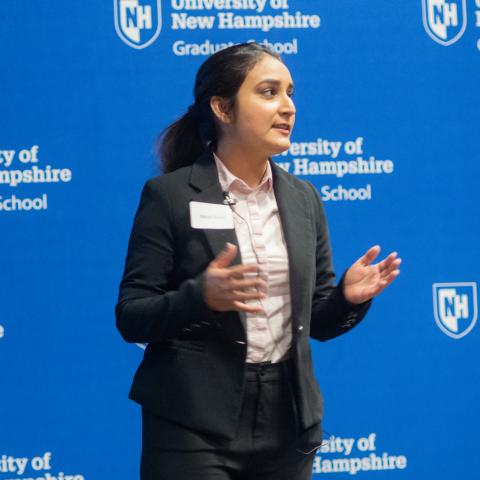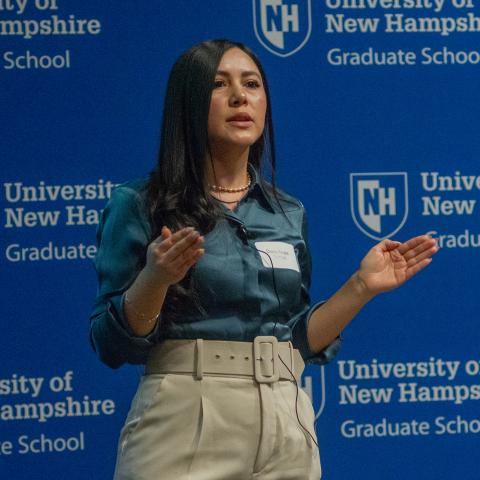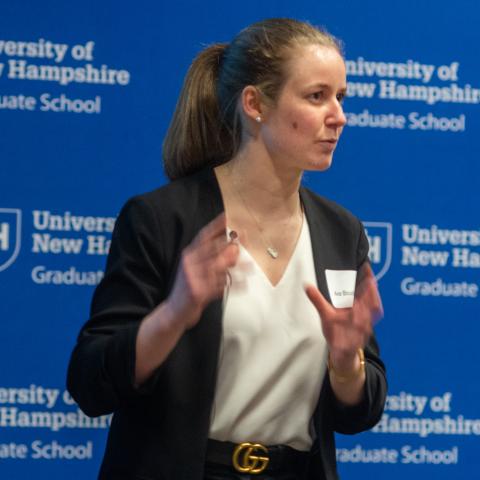
The Three Minute Thesis Competition
An 80,000 word Ph.D. thesis would take 9 hours to present. Their time limit...3 minutes.
Special thanks to our sponsor RiverStone for supporting this event.
The 2024 3MT Competition is taking place in February and April! Thirty applicants will be selected to compete. Applications are now closed.
3MT Overview
Three Minute Thesis (3MT®) celebrates the exciting research conducted by PhD students around the world. Developed by The University of Queensland (UQ), the competition cultivates students’ academic, presentation, and research communication skills. Presenting in a 3MT competition increases their capacity to effectively explain their research in three minutes, in a language appropriate to a non-specialist audience. Competitors are allowed one PowerPoint slide, but no other resources or props.
Our 3MT
The 8th annual 3MT competition took place in March 2023. We had 32 students compete and witnessed some fantastic presentations. We can't wait to see what our new and returning participants bring in 2024. To help students prepare for the 3MT we offer a workshop series that will guide students through the whole process-- developing the talk, creating the slide, and practicing the presentation.
view all the 2023 preliminary and final round presentations
Past Participants
The UNH Graduate School Media Channel hosts videos of the 3MT competitions from every year! Browse the channel at the link below to find 3MT presentations from participants across a range of disciplines and subjects. You can find direct links to the videos of our award winners from each year in the "Past 3MT Winners" section on this webpage as well.
UNH Graduate School Media Page
Official 3MT Website
2023 3MT Winners
2024 3MT Competition Schedule
Preliminary Round 1 - February 27th from 3-5pm, MUB Theater I
Preliminary Round 2 - February 28th from 3-5pm, MUB Theater I
3MT Final Round - April 8th from 4-6pm, MUB Theater II (followed by a reception from 6-7pm)
Upcoming workshop open to all UNH graduate students and postdocs
Introduction to the Three Minute Thesis (3MT)
Come for an overview of what the Three Minute Thesis (3MT) competition is and what makes a good 3MT, from content to audience to the way you present your research, orally and visually. Attendance can be in-person or virtual.
When: December 13, 11:00 AM - 12:00 PM
Where: Hamel Recreation Center room 107C or via Zoom
2023
- 1st place: Melanie Smith, Master's Student in Marine Biology
- 2nd place: Manjot Rekhi, PhD Student in Earth and Environmental Science
- 3rd place: Diana Reyes Gomez, PhD Student in Agricultural Sciences
- People's Choice Award: Ava Boutilier, Master's Student in Biochemistry
2022
- 1st place: Sathya Jagadeesan, PhD student in Chemical Engineering
- 2nd place: Nikolai Matukhno, Master's Student in Mechanical Engineering
- 3rd place & People’s Choice Award: Nick Pollak, PhD candidate in Chemistry
2021
- 1st place: David Heit, Msc Wildlife and Conservation Biology
- 2nd place: Via D'Agostino, MFA Fiction Writing
- 3rd place: Hannah Lightcap, PhD Psychology
- People’s Choice Award: Jess Flarity, PhD English Literature
2020
- 1st place: Jordan Pierce, MS Oceanography
- 2nd place: Allison Giannotti, PhD Composition & Rhetoric
- 3rd place: Isaiah Paolo Atienza Lee, PhD Molecular and Evolutionary Systems Biology
- People’s Choice Award: Danial Mirzaiyanrajeh, PhD Civil & Environmental Engineering
- People’s Choice Runner Up: Kerry Dykens, MS Oceanography
2019
- 1st place: Sidney Birch, PhD Molecular & Evolutionary Systems Biology
- 2nd place & People’s Choice Award: Zane Relethford, PhD Chemistry
- 3rd place: Katherine Ineson, PhD NRESS
2018
- 1st place: Jovana Milosavljevic Ardeljan, PhD Education
- 2nd place: Devon O'Rourke, PhD Molecular and Evolution Systems Biology
- 3rd place & People’s Choice Award: Kaitlyn Belknap, M.S. Genetics
2017
- 1st place: Drummond Biles, PhD, Mechanical Engineering
- 2nd place: Meagan Wengrove, PhD Ocean Engineering
- 3rd place: Ryan Stevens, PhD Natural resources
- People’s Choice Award: Rev. Holland Prior, MFA Creative Nonfiction
- People’s Choice Runner Up: Jovana Milosavljevic Ardeljan, PhD Education
2016
- 1st place & People’s Choice Award: Lesley Atwood, PhD Agroecology
- 2nd place: Susan Deily Swearingen, PhD History
- 3rd place: Maria Marin Jarrin, PhD Oceanography
- A single static PowerPoint slide is permitted. No slide transitions, animations, or "movement" of any description are allowed. The slide is to be presented from the beginning of the oration.
- No additional electronic media (e.g., sound and video files) are permitted.
- No additional props (e.g., costumes, musical instruments, laboratory equipment, etc.) are permitted.
- Presentations are limited to 3 minutes maximum and competitors exceeding 3 minutes are disqualified.
- Presentations are to be spoken word (e.g., no poems, raps or songs).
- Presentations are to commence from the front of the theater.
- Presentations are considered to have commenced when a presenter starts their presentation through either movement or speech.
- The decision of the adjudicating panel is final.
3 Minute Thesis presentations are judged using the following criteria:
Comprehension and Content
- Did the presentation provide an understanding of the background to the research question being addressed and its significance?
- Did the presentation clearly describe the key results of the research including conclusions and outcomes?
- Did the presentation follow a clear and logical sequence?
- Was the thesis topic, key results and research significance and outcomes communicated in language appropriate to a non-specialist audience?
- Did the speaker avoid scientific jargon, explain terminology and provide adequate background information to illustrate points?
- Did the presenter spend adequate time on each element of their presentation - or did they elaborate for too long on one aspect so that other aspects of the presentation felt rushed?
Engagement and Communication
- Did the oration make the audience want to know more?
- Was the presenter careful not to trivialize or generalize their research?
- Did the presenter convey enthusiasm for their research?
- Did the presenter capture and maintain their audience's attention?
- Did the speaker have sufficient stage presence, eye contact and vocal range; maintain a steady pace, and have a confident stance?
- Did the PowerPoint slide enhance the presentation - was it clear, legible, and concise?




